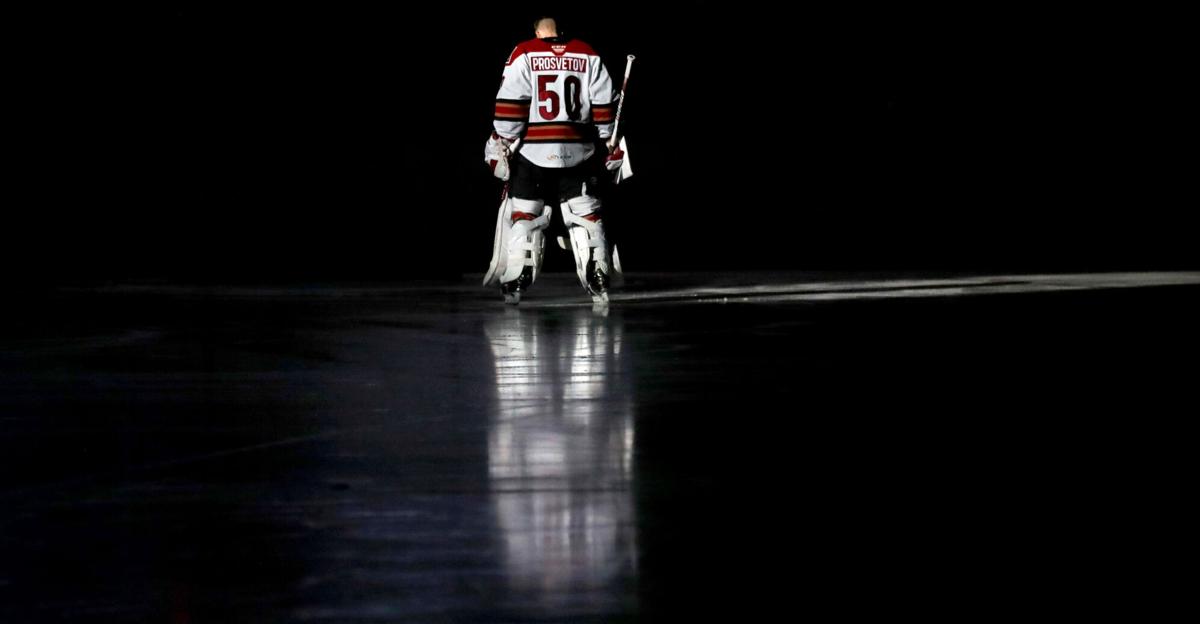There may be no better indicator of the Tucson Roadrunners’ up-and-down 2021-22 season than these two wildly disparate truths:
Forwards Matias Maccelli and Mike Carcone have been electric, with the pair racing up the league scoring charts and on pace to shatter Tucson’s single-season club records for goals and points, respectively, this season.
And Tucson’s defense is second-worst in the American Hockey League, with the Roadrunners’ goaltenders hovering near the bottom of the league in both goals against average and save percentage.
Tucson needs every element of its game clicking this weekend to get back into the AHL postseason race. The Roadrunners (15-22-2-1) welcome the Henderson Silver Knights (22-14-2-1) to Tucson Arena at 7 p.m. Saturday in the first of two this weekend and four in a row at home over the next two weeks.
Maccelli, currently third in the AHL with 48 points in 38 games, and Carcone, whose 17 goals are a career already and just six back of the club’s single-season mark, have earned well-deserved praise from their coaches.
“It’s truly impressive,” Tucson head coach Jay Varady said about what Maccelli, in his first year as a professional in North America, and Carcone, a journeyman who found his footing with the Roadrunners, have done this year. “Just look at the names of the players that have played here. It’s hard to be productive offensively night-in, night out and those guys have done that.”
Varady wasn’t ready to necessarily lay blame for his team’s defensive woes squarely on the pads of his goaltenders, including third-year Roadrunner Ivan Prosvetov. Instead, Varady said he hopes a return to Tucson, where his club has spent just one of the past five weeks, allows for a return to fundamentals. After all, he noted, roughly 40% of the 2021-22 regular season remains.
“You can run any system you want. You run this forecheck, and that defensive zone coverage, and that forecheck neutral zone. You can draw all that on the white board,” he said. “But if you don’t have the fundamentals of the game, in those systems or structure, you won’t be successful. So our focus right now is just the fundamentals.”
Prosvetov agreed that returning to Tucson, where the Roadrunners have played just three times over its last 15 games, might allow him to get back to basics.
“I’m an athletic guy, so just slowing down the game for me is important,” Prosvetov said. “Making those reads, and making the game more simple.”
After beginning the season with back-to-back shutouts, Prosvetov has allowed fewer than three goals just five times in 22 appearances. That includes a stretch over the last month that’s seen him pulled twice, or, in his last appearance on Feb. 7 at Abbotsford, coming in cold in relief of teammate Josef Kořenář, but giving up four goals on eighteen shots in roughly half a game of ice time.
Of qualified goaltenders — those who have played enough games to qualify for the league lead in a multitude of statistical areas — Kořenář’s .859 save percentage and 4.29 goals against average in 17 appearances are both dead last in the AHL. Prosvetov’s numbers aren’t much better: His .882 save percentage is fifth from the bottom out of 42 qualified netminders, and his 3.56 goals against average is third-worst.
The last few week have been especially tough. In four of his Prosvetov’s last nine appearances, he hasn’t played a full game. Twice, he was pulled early; the other two times, he stepped in in relief. Varady has pulled his goalie in three of the Roadrunners’ last four games and in five of their last 11.
Perhaps that’s part and parcel for a team with a 5-13-0-1 record since the turn of the new year. Prosvetov thinks it’s fixable, though.
“I really trust the natural process, too,” Prosvetov said.
“You play more games,” he said. “You’re not just getting older, you’re getting smarter.”
Across the board — be it defense, goaltending, balanced scoring, or making a nearly-league-worst penalty kill productive again — it’s not one big thing, Tucson captain Hudson Fasching said.
“It’s not anything really crazy,” he said. “Small little plays. Even line changes, or decisions with the puck.
“Of course I think the big thing for us is just finding consistency,” he added, noting that the difference between winning 2-1 and losing by three or four goals might not be as big as it seems. “It’s those small, consistent things that need ironed out. I think we’re going to find our games in a really good spot when we kind of put all those pieces together.”





